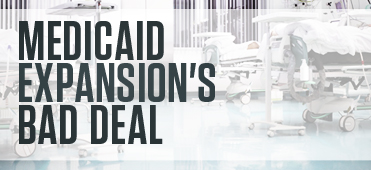Media

Will Modified Medicaid Expansion Bring Needed Reforms?
While Pennsylvania waits to learn the fate of the Healthy PA waiver, Indiana is making headlines as the latest state to propose a modified expansion.
The Healthy Indiana Plan 2.0, unveiled by Governor Mike Pence last week, expands Medicaid to secure federal dollars while maintaining remnants of the state’s highly successful HSA plan for Medicaid enrollees. For instance, the minimum payment for enrollees in 2012 was $160, under HIP 2.0 it’s $0.
A growing number of governors are trying to squeeze reforms out of Washington by agreeing to expand Medicaid. But minimal reforms are not worth the cost of further deteriorating the quality of care and impeding patients’ ability to escape poverty and transition to private health insurance.
Any expansion of Medicaid places more individuals in the poverty trap because it fails to provide tools to help individuals make the transition from “free” health care to increasingly expensive private health insurance. A recent study by the National Bureau of Economic Research shows expansion will reduce the labor force participation rate by 1% and reduce earnings. Similarly a study from Emory University and the University of Colorado found Medicaid eligibility is associated with a decline in labor force participation among childless adults.
No matter what, every expansion of Medicaid is the extension of a broken entitlement program. It commits state taxpayers to rising and unpredictable costs for years to come.
Pennsylvania’s Medicaid costs are already unsustainable, consuming about one third of the operating budget and growing faster than state revenues. Eventually, lawmakers will be compelled to force more rationing of care through lower provider reimbursements or benefit reductions. Both deteriorate the quality of care given to Medicaid receipients.
We can, and should, heed the experience of states that have chosen to expand Medicaid. Those states that have expanded with and without reforms are seeing higher than expected costs. In Arkansas, the private option is facing serious cost overruns that could top $16 million. In Rhode Island, Medicaid enrollment is more than double what the state expected, translating into an extra $52 million. In Nevada, one hospital system was forced to take out more than $40 million in loans because the state can’t process new Medicaid applications fast enough—despite hiring an additional 400 workers. They expect to surpass their June 2015 enrollment goal of 490,000 within a few months.
Medicaid expansion in any form won’t serve our neediest citizens better nor will it reduce taxpayers’ costs. The best course of action for governors around the country is to walk away from this bad idea and continue to insist on the state flexibility that will empower us to truly help our citizens.